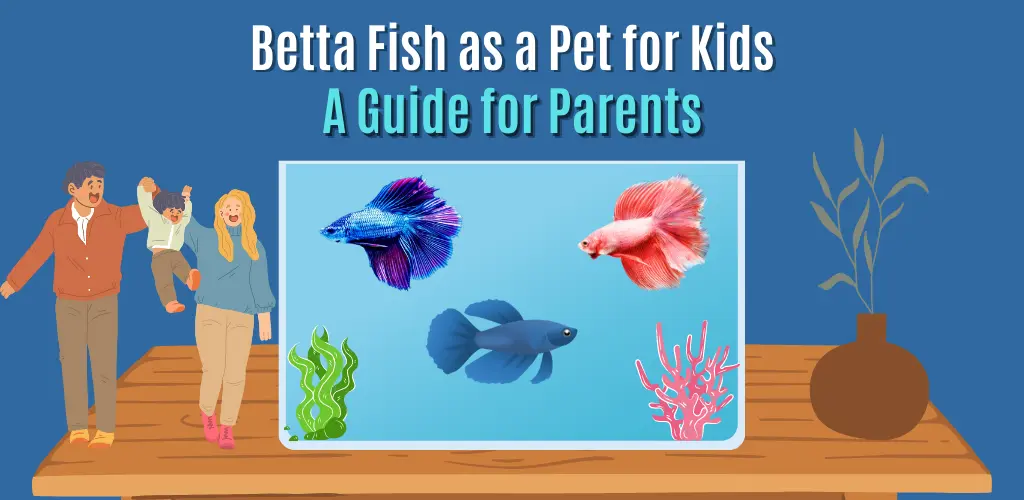Betta fish, also known as Siamese fighting fish, is a popular choice for families interested in getting a pet for their kids. These vibrant, colorful fish can make a beautiful addition to any household. However, certain factors must be considered before deciding whether betta fish is the right pet for your family, especially for your kids.
Advantages of Betta Fish as a Pet for Kids

Easy to Care for
Betta fish are relatively low-maintenance pets, making them an ideal choice for families with busy lifestyles. They do not require daily walks or special grooming, and they can thrive in small habitats, such as a fish bowl or a small aquarium. This makes it easy for kids to take care of them, especially with the help of an adult.
Stress-Relieving
Betta fish can be a source of stress relief and relaxation for kids. Watching their graceful swimming movements can be calming and can help reduce anxiety. This makes betta fish a great pet for kids who struggle with stress and anxiety.
Educational
Betta fish can also be a valuable educational tool for kids. They can learn about the importance of taking care of a pet and the basics of fish biology and behavior. This can help foster a love for animals and nature and be a stepping stone for kids interested in pursuing a career in biology or veterinary science.
Aesthetic Appeal
In addition to their practical benefits, betta fish are beautiful to look at and can add a pop of color and liveliness to any room. With their vibrant, colorful fins and tails, betta fish can make a beautiful and unique addition to any home or office.
Disadvantages of Betta Fish as a Pet for Kids

Short Lifespan
One of the biggest disadvantages of betta fish as a pet for kids is their short lifespan. Betta fish typically live for 2-3 years, which can be difficult for kids who have formed a bond with their pets. This can be a source of sadness and disappointment for kids, especially if they are unprepared for the loss.
Sensitive to Water Quality
Betta fish are also sensitive to water quality, meaning the water in their habitat must be clean and free of pollutants. This can be a challenge for kids new to pet care, requiring an adult to assist with regular water changes and testing.
Limited Interaction
Betta fish are solitary creatures and do not like to be in the presence of other fish. This means that they cannot be kept in a community tank and have limited interaction with their owners. While kids can still enjoy watching their pet swim, they cannot play with or hold their betta fish like they would with a cat or a dog.
Health Issues
Betta fish can be prone to diseases and health problems if not kept in a suitable environment. Poor water quality, lack of proper filtration, and inadequate temperature control can all lead to health problems in betta fish. It is important for betta fish owners to educate themselves about the specific needs of betta fish and to take steps to ensure their fish are kept in a healthy environment.
Aggression
Another disadvantage of keeping a betta fish is that they can be aggressive towards other fish and may not be suitable for community aquariums. This means that betta fish owners must take care to keep their fish separate from other fish species to avoid conflict. This can limit the types of fish that can be kept in the same aquarium as a betta fish and may also require additional equipment or space to accommodate the fish.
Dietary Requirements
Betta fish also require a consistent and varied diet, which can be difficult for some pet owners to provide. This may require additional research and effort to ensure that your betta fish receives the proper nutrients to maintain health. It is important to provide a varied and balanced diet to help keep your betta fish healthy and prevent dietary-related health problems.
Requirements for Keeping a Betta Fish

- Tank size: The minimum tank size for a single Betta fish is 5 gallons. A larger tank is always better, providing more swimming space and stable water conditions.
- Water temperature: Bettas are tropical fish and require a water temperature between 78-80°F. A heater is necessary to maintain a consistent temperature.
- Water quality: Bettas are sensitive to water quality, so a filter and regular water changes are essential. A filter will help to keep the water clean and remove harmful toxins.
- Water chemistry: Bettas prefer slightly acidic water with a pH range of 6.5-7.5. Testing the water regularly and adjusting the pH if necessary is essential.
- Tank decorations: Bettas love to explore and hide, so it’s crucial to provide them with plenty of hiding places and decorations like plants, rocks, and caves.
- Lighting: Bettas don’t require a lot of light, but they do need a regular day/night cycle. A timer can ensure the tank is illuminated for 8-10 hours daily.
- Food: Bettas are carnivores and require a diet of high-quality pellets or frozen/live food. It’s important to feed them small portions twice a day.
- Tank mates: Bettas are aggressive and territorial, so they should be kept alone or with non-aggressive fish that won’t nip their fins or invade their space. A tank divider can be used to separate multiple Bettas.
Laws and Regulations of Keeping a Betta Fish
Laws and regulations regarding owning a betta fish vary depending on your country and state. In some places, there may be no specific laws regulating the ownership of betta fish.
However, in other places, there may be strict regulations on the sale, purchase, and ownership of betta fish due to animal welfare and conservation concerns. For example, in some states in the US, it is illegal to keep betta fish in containers that are less than one gallon in size.
In other countries, there may be restrictions on the import and export of betta fish to protect local ecosystems from invasive species. Researching and understanding your area’s laws and regulations before purchasing a betta fish is vital to ensure that you are following all requirements and not breaking any rules.
Additionally, it is crucial to provide proper care and attention to your betta fish to ensure its health and well-being.
Common Diseases Faced by Betta Fish in an Aquarium
Betta fish are susceptible to various diseases when kept in an aquarium. One of the most common diseases is Ich, caused by a parasite that causes small white spots on the fish’s body.
Another disease that betta fish often face is fin rot, which can be caused by poor water quality or bacterial infection. Symptoms of fin rot include frayed fins or fins that appear to be rotting away.
Dropsy is another disease that betta fish can contract, caused by bacterial infection. It results in the fish’s body swelling and the scales protruding outwards.
Velvet is another disease that affects betta fish, and it is caused by a parasite that makes the fish’s skin appear to have a yellow or brown velvet coating.
Columnaris is a bacterial infection that can cause ulcers on the fish’s body and can be fatal if not treated promptly.
It’s essential to keep a close eye on your betta fish’s behavior and appearance to catch any signs of illness early on and provide proper treatment.
Conclusion
In conclusion, betta fish can be a good pet for kids, especially for families who are looking for a low-maintenance pet that can be a source of stress relief and education. However, it is important to consider betta fish’s short lifespan and their water quality sensitivity before deciding to get one as a pet. With the help of an adult, kids can enjoy the many benefits of having a betta fish as a pet and learn valuable lessons about responsibility and pet care.
Frequently Asked Questions
Q1: What are betta fish, and why are they popular pets for kids?
A: Betta fish are small, brightly colored fish native to Southeast Asia. They are popular pets for kids due to their bright colors, ease of care, and small size, which makes them a great option for smaller aquariums or bowls.
Q2: What is the lifespan of a betta fish?
A: Betta fish typically live for 2 to 3 years, although some betta fish can live longer with proper care.
Q3: How much care do betta fish require?
A: Betta fish require simple care, including a clean and stable environment, proper diet, and adequate filtration. However, they can be prone to health problems if they are not kept in a suitable environment and can be sensitive to sudden changes.
Q4: Can betta fish be kept with other fish species?
A: Betta fish can be aggressive towards other fish and may not be suitable for community aquariums. It is best to keep betta fish separate from other fish species to avoid conflict.
Q5: Are betta fish easy for kids to care for?
A: Betta fish are relatively easy to care for but require a consistent and varied diet and a clean and stable environment. It is important for kids to understand the specific needs of betta fish and to be able to provide adequate care.
Q6: What should I look for when choosing a betta fish as a pet for my child?
A: When choosing a betta fish as a pet for your child, look for a healthy, active fish with clear eyes and fins. Choosing a reputable pet store that follows appropriate animal care practices is also important.
Q7: Can betta fish live in a bowl, or do they need an aquarium?
A: Betta fish can live in a bowl but do better in a small aquarium with a filter. An aquarium will provide a larger and more stable environment for the fish.
Q8: What should I feed my betta fish?
A: Betta fish require a varied and balanced diet that includes dry and wet food. It is important to research the specific dietary needs of betta fish and to provide a diet that meets those needs




Pingback: Bump On Betta Fish Head: Causes And Treatments - Betta Fish Advice